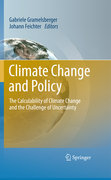
Climate change and policy: the calculability of climate change and the challenge of uncertainty
Gramelsberger, Gabriele
Feichter, Johann
The debate on how mankind should respond to climate change is diverse, as theappropriate strategy depends on global as well as local circumstances. As scientists are denied the possibility of conducting experiments with the real climate, only climate models can give insights into man-induced climate change, by experimenting with digital climates under varying conditions and by extrapolating past and future states into the future. But the ‘nature’ of models is a purely representational one. A model is good if it is believed to represent the relevant processes of a natural system well. However, a model and its results, in particular in the case of climate models which interconnect countless hypotheses, is only to some extent testable, although an advanced infrastructureof evaluation strategies has been developed involving strategies of model intercomparison, ensemble prognoses, uncertainty metrics on the system and component levels. The complexity of climate models goes hand in hand with uncertainties, but uncertainty is in conflict with socio-political expectations. However, certain predictions belong to the realm of desires and ideals rather than toapplied science. Today’s attempt to define and classify uncertainty in terms of likelihood and confidence reflect this awareness of uncertainty as an integral part of human knowledge, in particular on knowledge about possible future developments. The contributions in this book give a first hand insight into scientific strategies in dealing with uncertainty by using simulation models andinto social, political and economical requirements in future projections on climate change. Do these strategies and requirements meet each other or fail?. The debate on how mankind should respond to climate change is diverse, as the appropriate strategy depends on global as well as local circumstances. As scientists are denied the possibility of conducting experiments with the real climate, only climate models can give insights into man-induced climate change, byexperimenting with digital climates under varying conditions and by extrapolating past and future states into the future. But the 'nature' of models is a purely representational one. A model is good if it is believed to represent therelevant processes of a natural system well. However, a model and its results, in particular in the case of climate models which interconnect countless hypotheses, is only to some extent testable, although an advanced infrastructure of evaluation strategies has been developed involving strategies of model intercomparison, ensemble prognoses, uncertainty metrics on the system and component levels. The complexity of climate models goes hand in hand with uncertainties, but uncertainty is in conflict with socio-political expectations. However,certain predictions belong to the realm of desires and ideals rather than to applied science. Today's attempt to define and classify uncertainty in terms of likelihood and confidence ref Discussion of most important topic in current climate research Bridges thegap between climate modellers and policy-/decision makers Calculability of uncertainty and its influence on society INDICE: 1 Introduction to the Volume. 2 Modelling the Climate System – An Overview. 3 Climate Simulation, Uncertainty, and Policy Advice - The Case of the IPCC.- 4 Dealing with Uncertainty – From climate research to integrated assessment of policy options. 5 Uncertainty in Climate Policy – Impacts on MarketMechanisms. 6 Insuring climate change – Managing political and economic uncertainties in flood management. 7 Climate Science, Weather and Climate Engineering, and Scientific Objectivity. 8 Utilizing participatory scenario-based approaches to design proactive responses to climate change in the face of uncertainties. 9 Image Politics – Picturing uncertainty. The role of images in climatology and climate policy. 10 Glossary and Abbreviations. 11 Authors. 12 Index.
- ISBN: 978-3-642-17699-9
- Editorial: Springer Berlin Heidelberg
- Encuadernacion: Cartoné
- Páginas: 241
- Fecha Publicación: 31/03/2011
- Nº Volúmenes: 1
- Idioma: Inglés
